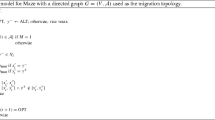Abstract
We propose and analyse two island models that provably find good approximations for the SetCover problem. A homogeneous island model running parallel instances of the SEMO algorithm—following Friedrich et al. (Evolutionary Computation 18(4), 2010, 617-633)—leads to significant speedups over a single SEMO instance, but at the expense of large communication costs. A heterogeneous island model, where each island optimises a different single-objective fitness function, provides similar speedups at reduced communication costs. We compare different topologies for the homogeneous model and different migration policies for the heterogeneous one.
Access this chapter
Tax calculation will be finalised at checkout
Purchases are for personal use only
Preview
Unable to display preview. Download preview PDF.
Similar content being viewed by others
References
Luque, G., Alba, E.: Parallel Genetic Algorithms–Theory and Real World Applications. Springer (2011)
Nedjah, N., de Macedo Mourelle, L., Alba, E.: Parallel Evolutionary Computations. Springer (2006)
Tomassini, M.: Spatially Structured Evolutionary Algorithms: Artificial Evolution in Space and Time. Springer (2005)
Skolicki, Z., De Jong, K.: The influence of migration sizes and intervals on island models. In: Proc. of GECCO 2005, pp. 1295–1302. ACM (2005)
Rudolph, G.: Takeover time in parallel populations with migration. In: Filipic, B., Silc, J. (eds.) Proc. of BIOMA 2006, pp. 63–72 (2006)
Lässig, J., Sudholt, D.: The benefit of migration in parallel evolutionary algorithms. In: Proc. of GECCO 2010, pp. 1105–1112. ACM (2010)
Lässig, J., Sudholt, D.: Experimental Supplements to the Theoretical Analysis of Migration in the Island Model. In: Schaefer, R., Cotta, C., Kołodziej, J., Rudolph, G. (eds.) PPSN XI. LNCS, vol. 6238, pp. 224–233. Springer, Heidelberg (2010)
Watson, R.A., Jansen, T.: A building-block royal road where crossover is provably essential. In: Proc. of GECCO 2007, pp. 1452–1459. ACM (2007)
Neumann, F., Oliveto, P.S., Rudolph, G., Sudholt, D.: On the effectiveness of crossover for migration in parallel evolutionary algorithms. In: Proc. of GECCO 2011, pp. 1587–1594. ACM (2011)
Lässig, J., Sudholt, D.: General Scheme for Analyzing Running Times of Parallel Evolutionary Algorithms. In: Schaefer, R., Cotta, C., Kołodziej, J., Rudolph, G. (eds.) PPSN XI. LNCS, vol. 6238, pp. 234–243. Springer, Heidelberg (2010)
Lässig, J., Sudholt, D.: Adaptive population models for offspring populations and parallel evolutionary algorithms. In: Proc. of FOGA 2011, pp. 181–192. ACM (2011)
Lässig, J., Sudholt, D.: Analysis of Speedups in Parallel Evolutionary Algorithms for Combinatorial Optimization. In: Asano, T., Nakano, S.-i., Okamoto, Y., Watanabe, O. (eds.) ISAAC 2011. LNCS, vol. 7074, pp. 405–414. Springer, Heidelberg (2011)
Burke, E.K., Hart, E., Kendall, G., Newall, J., Ross, P., Schulenburg, S.: Hyper-heuristics: An emerging direction in modern search technology, pp. 457–474. Kluwer (2003)
Friedrich, T., He, J., Hebbinghaus, N., Neumann, F., Witt, C.: Approximating covering problems by randomized search heuristics using multi-objective models. Evolutionary Computation 18(4), 617–633 (2010)
Doerr, B., Eremeev, A.V., Neumann, F., Theile, M., Thyssen, C.: Evolutionary algorithms and dynamic programming. Theoretical Computer Science 412(43), 6020–6035 (2011)
Skolicki, Z.: An Analysis of Island Models in Evolutionary Computation. PhD thesis, George Mason University, Fairfax, VA (2000)
Alba, E.: Parallel evolutionary algorithms can achieve super-linear performance. Information Processing Letters 82(1), 7–13 (2002)
Chvatal, V.: A greedy heuristic for the set-covering problem. Mathematics of Operations Research 4(3), 233–235 (1979)
Lässig, J., Sudholt, D.: General upper bounds on the running time of parallel evolutionary algorithms. ArXiv e-prints (2012) Extended version of [10], http://arxiv.org/abs/1206.3522 .
Author information
Authors and Affiliations
Editor information
Editors and Affiliations
Rights and permissions
Copyright information
© 2012 Springer-Verlag Berlin Heidelberg
About this paper
Cite this paper
Mambrini, A., Sudholt, D., Yao, X. (2012). Homogeneous and Heterogeneous Island Models for the Set Cover Problem. In: Coello, C.A.C., Cutello, V., Deb, K., Forrest, S., Nicosia, G., Pavone, M. (eds) Parallel Problem Solving from Nature - PPSN XII. PPSN 2012. Lecture Notes in Computer Science, vol 7491. Springer, Berlin, Heidelberg. https://doi.org/10.1007/978-3-642-32937-1_2
Download citation
DOI: https://doi.org/10.1007/978-3-642-32937-1_2
Publisher Name: Springer, Berlin, Heidelberg
Print ISBN: 978-3-642-32936-4
Online ISBN: 978-3-642-32937-1
eBook Packages: Computer ScienceComputer Science (R0)




